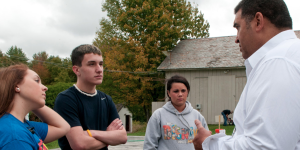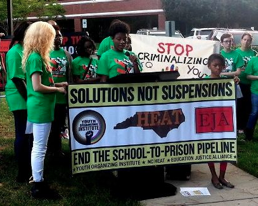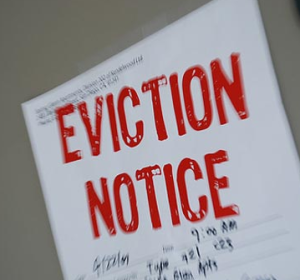News & Announcements
- Details
- Written by Joshua Wachtel
 Aerial photo of University of Florida campus by James Jones (Puggles) at Flickr Creative CommonsBrianna Donet of WUFT, National Public Radio from the University of Florida, reports, "Restorative justice is gaining popularity among college campuses, including at the University of Florida." The report continues:
Aerial photo of University of Florida campus by James Jones (Puggles) at Flickr Creative CommonsBrianna Donet of WUFT, National Public Radio from the University of Florida, reports, "Restorative justice is gaining popularity among college campuses, including at the University of Florida." The report continues:
Restorative justice practices are providing new avenues for describing justice and addressing law violations, Chris Loschiavo, Assistant Dean of Students, and Director of Student Conduct and Conflict Resolution, said. These practices focus on the needs of the victims, the offenders and the community, instead of simply working to punish the offender, he said.
- Details
- Written by Joshua Wachtel
 Photo by Stuart Munro at the Wanganui Chronicle.In Wanganui, New Zealand, a city striving to become a restorative city, a company that "failed to ensure its employees' safety after a toxic leak," according to the court reporter for the Wanganui Chronicle, has pled guilty in court and is now requesting a restorative justice conference between the company and the injured workers. The report states:
Photo by Stuart Munro at the Wanganui Chronicle.In Wanganui, New Zealand, a city striving to become a restorative city, a company that "failed to ensure its employees' safety after a toxic leak," according to the court reporter for the Wanganui Chronicle, has pled guilty in court and is now requesting a restorative justice conference between the company and the injured workers. The report states:
"The leak on November 2 last year saw 21 workers exposed to hydrogen sulphide after a mix-up of chemicals. Two workers were in hospital for a week. ... The section 6 charge carries a maximum fine of $250,000 and judges may, at their discretion, also order emotional harm reparations to be paid.
- Details
- Written by IIRP

The 16th IIRP World Conference
October 21-23, 2013 | Bethlehem, Pennsylvania
Pre/post-conference Oct. 19-20 & Oct. 24-25
- Details
- Written by Joshua Wachtel
It's great to see more and more TedX talks tackling issues of restorative practices from a variety of perspectives. Here's a recent talk given by Symeon Brown at TedX Southwark in the UK. According to his bio, "Symeon has worked at the Howard League for Penal Reform with young men and women in custody, founded a grassroots youth project HYPE and was the senior researcher of the Guardian and London School of Economics investigation into the England riots."
Symeon begins his talk by looking at crime in terms of Saturday morning comics (which everyone loves!) but then turns to the topic of "Who are the real bad guys in Britain's jails?" He says that the vast majority are children, mentally ill and people who were formerly in the "carer" or social welfare system.
- Details
- Written by Joshua Wachtel
Susan Leigh Deppe, MD, offered a popular two-part session at IIRP's 16th World Conference on emotion, affect theory and restorative practices. The piece below describes some of the main points of her presentation.
SO THAT’S WHAT’S GOING ON!
UNDERSTANDING EMOTION IN RESTORATIVE PRACTICES
 Communities and schools struggle with behaviors such as crime, bullying, rudeness, and violence. These echo popular culture, where people often act macho and explosive. Actions and attitudes are absorbed out of awareness from the emotional milieu surrounding us, whether family, media, faith community, or schools. Our emotional patterns are sculpted by life experience. People who manage emotion poorly are more likely to be alienated from others or involved in substance abuse, crime and other negative behaviors.
Communities and schools struggle with behaviors such as crime, bullying, rudeness, and violence. These echo popular culture, where people often act macho and explosive. Actions and attitudes are absorbed out of awareness from the emotional milieu surrounding us, whether family, media, faith community, or schools. Our emotional patterns are sculpted by life experience. People who manage emotion poorly are more likely to be alienated from others or involved in substance abuse, crime and other negative behaviors.
- Details
- Written by Joshua Wachtel
 According to a piece in the St. Louis Review, a publication of the Archdiocese of St. Louis, Catholic schools there and in several other states are adapting restorative practices to a Catholic-school context with great success. In the article titled, "Restoring a safe, positive, welcome for all students," writer Joseph Kenny begins:
According to a piece in the St. Louis Review, a publication of the Archdiocese of St. Louis, Catholic schools there and in several other states are adapting restorative practices to a Catholic-school context with great success. In the article titled, "Restoring a safe, positive, welcome for all students," writer Joseph Kenny begins:
Fourteen schools in the Archdiocese of St. Louis have become certified as virtue-based restorative discipline (VBRD) schools, addressing bullying issues through Catholic identity and restoring a safe, positive and welcoming environment for all.
- Details
- Written by Joshua Wachtel
David Karp, a professor of sociology at Skidmore College, recently wrote an op-ed piece for the Albany, New York, Times Union arguing for broader use of restorative justice. Here are several anecdotes used to illustrate the point:
 Photo by J. C. Rice from the New York Daily News shows several teens talking to Holloway before helping clean his houseOn Labor Day weekend, a large group of teenagers held an unauthorized party at the Rensselaer County vacation home of ex-NFL player Brian Holloway. Pictures from the party and accusations by Holloway that it caused $20,000 in damage have caused a media sensation. So far, six teenagers have been arrested. As the victim of an alleged crime, Holloway is understandably angry, and many of the teenagers and their parents are anxious about potential criminal consequences. Rather than resolving this in court, using a restorative justice approach may be the best solution.
Photo by J. C. Rice from the New York Daily News shows several teens talking to Holloway before helping clean his houseOn Labor Day weekend, a large group of teenagers held an unauthorized party at the Rensselaer County vacation home of ex-NFL player Brian Holloway. Pictures from the party and accusations by Holloway that it caused $20,000 in damage have caused a media sensation. So far, six teenagers have been arrested. As the victim of an alleged crime, Holloway is understandably angry, and many of the teenagers and their parents are anxious about potential criminal consequences. Rather than resolving this in court, using a restorative justice approach may be the best solution.
- Details
- Written by Joshua Wachtel
 Dignity in Schools, a national organizations that unites parents, youth, advocates and educators to support alternatives to a culture of zero-tolerance, punishment and removal in schools, reports on its National Week of Action Against School Pushout:
Dignity in Schools, a national organizations that unites parents, youth, advocates and educators to support alternatives to a culture of zero-tolerance, punishment and removal in schools, reports on its National Week of Action Against School Pushout:
"The Fourth Annual National Week of Action took place from September 28 to October 5, 2013. Over 60 organizations in 22 states joined the Dignity in Schools Campaign to 'Push Back Against School Pushout' in our largest Week of Action to date. Students, parents, teachers and advocates lifted their voices to demand an end to school disciplinary policies that push students out of school and down a pipeline to prison and low-wage jobs.
"During this year’s Week of Action, we raced against the U.S. government shutdown clock with our SparkAction alert urging members of the Senate to support federal school discipline reform. On September 30 our message reached 150,000 people on social media via Thunderclap. Over the course of the week, almost 2 million Twitter posts (tweets) used the #SchoolPushout hashtag and our Facebook posts reached about 13,000 unique users. We also added a Dignity in Schools Tumblr page and an Instagram account to share photos of actions and events across the country!"
Each day of the week featured a theme like Solutions Not Suspensions, Counselors Not Cops and Restorative Justice.
Read about the week in a post that highlights events from across the country day by day.
- Details
- Written by Joshua Wachtel
 Eigen Kracht (Dutch for “Our Power”) is a non-profit organization that has done an incredible amount of grassroots work throughout the Netherlands to make the family group conference (FGC, which in North America is known as Family Group Decision Making or FGDM) the go-to process for empowering people and their communities of care to find solutions to some of their most pressing problems. Eigenkracht has trained community volunteers throughout the country to interface with social services and other government agencies, to coordinate with families, and come up with plans, particularly with regards to caring for children at risk of placement in the social welfare system. But Eigenkracht has always argued that FGC may be used more widely, whenever a family needs to make a plan requiring the support of its larger community of support.
Eigen Kracht (Dutch for “Our Power”) is a non-profit organization that has done an incredible amount of grassroots work throughout the Netherlands to make the family group conference (FGC, which in North America is known as Family Group Decision Making or FGDM) the go-to process for empowering people and their communities of care to find solutions to some of their most pressing problems. Eigenkracht has trained community volunteers throughout the country to interface with social services and other government agencies, to coordinate with families, and come up with plans, particularly with regards to caring for children at risk of placement in the social welfare system. But Eigenkracht has always argued that FGC may be used more widely, whenever a family needs to make a plan requiring the support of its larger community of support.
- Details
- Written by Joshua Wachtel
In this piece, journalist Robert Koehler unearths one of the roots of the restorative justice movement in the work of an indigenous community in Manitoba that reached "deep into their souls and into the roots of a lost way of life, to save their children and the future."
Sincere thanks to Koehler for allowing us to repost this piece in full.

Restorative Works Year in Review 2024 (PDF)
All our donors are acknowledged annually in Restorative Works.
